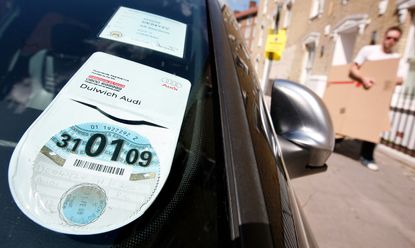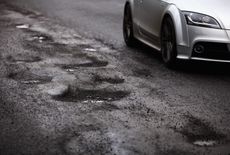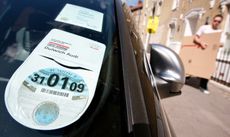Road tax: what’s changed in 2019?
Motorists now face forking out up to £65 more

Owners of high-polluting cars now face fresh vehicle tax hikes under changes that came into force in April.
The increases, announced in the autumn Budget last year, sees some drivers paying up to £65 more in Vehicle Excise Duty (VED) in the first year of car ownership.
Electric car owners can breath a sigh of relief, though. EVs are still exempt road tax as part of an incentive to push buyers towards cleaner vehicles.
Subscribe to The Week
Escape your echo chamber. Get the facts behind the news, plus analysis from multiple perspectives.

Sign up for The Week's Free Newsletters
From our morning news briefing to a weekly Good News Newsletter, get the best of The Week delivered directly to your inbox.
From our morning news briefing to a weekly Good News Newsletter, get the best of The Week delivered directly to your inbox.
Here’s our guide to the changes that came into force in 2019, VED rates and how to get car tax refunds:
What’s changed?
From 1 April, tax increased “in line with inflation” for all cars, under plans buried in the “small print” of Chancellor Philip Hammond’s Budget last October, says financial news site This Is Money.
Most motorists are required to pay an additional £5 on top of today’s VED rates, while owners of older, high-emission models could be charged up to £65 more.
The Daily Express lists the bands for the increases as follows:
- Cars producing between 76g/km and 150g/km CO2 pay £5 more
- 151 to 170 g/km CO2 - +£15
- 171 to 190g/km CO2 - +£25
- 191 to 225g/km CO2 - +£40
- 226 to 255g/km CO2 - +£55
- Over 255g/km CO2 - +£65
Owners of cars producing less than 76g/km of CO2 emissions will continue paying the same rates, while zero-emissions vehicle drivers will remain exempt from VED.
Do the road tax changes apply throughout the UK?
Yes. The system is identical in England, Scotland and Wales. Since April 2015, drivers in Northern Ireland have also no longer had to display MoT discs.
How can you check when your road tax is due?
You should be sent a reminder by the DVLA when your vehicle tax is due for renewal, but you can also head to the agency’s official website to see whether your car is taxed and if it has a valid MOT. All you need to do is enter your vehicle’s registration number to see when its tax and MOT expires.
Can I pay using direct debut?
Yes you can. You'll make a small saving of a few quid and your road tax will never expire as long as your MoT remains valid. When you sell your car, you will have to let your bank or the DVLA know, to ensure you don't pay more than you owe. HGVs and fleet cars cannot be taxed by direct debit.
Can I transfer road tax between cars?
No. Road tax can no longer be transferred with the vehicle, which means the buyer will not benefit if there are unused months left on the tax disc. They will have to renew the tax straight away. The seller can claim a refund from DVLA for any full calendar months left on the vehicle's tax, but will forfeit the remainder of the present month.
This has had many drivers up in arms. "What this means is that the government effectively collects two lots of tax on the car for the month where ownership is transferred," says Auto Express. "It's sneaky stuff and should give a useful boost to the exchequer, but at the expense of motorists."
Confusion over the new rules has also been blamed for a dramatic rise in prosecutions for untaxed vehicles. According to DVLA data obtained by AutoExpress, 117,490 enforcement cases were created in the six months after the tax disc was scrapped, compared with 82,999 or 86,939 in the previous two six-month periods when the tax disc was still in operation. Out-of-court settlements also doubled from 53,799 to 97,348 in the six-month period, while the number of cars clamped for unpaid road tax has soared from around 5,500 per month to 8,800.
DVLA said the increase was caused by the system shake-up rather than any enhanced enforcement or motorists attempting to evade tax. AA president Edmund King said it was right that those who deliberately evade paying vehicle tax are "caught and punished". But he said it was "a very harsh lesson for those who may not be aware a tax disc is now automatically cancelled when a vehicle changes keepership".
What happens when I buy or sell a car?
As road tax no longer comes with a car when you buy it, you will have to tax the vehicle before driving it. To do this, you need either the 11-digit reference number on your logbook (V5C) if the car is registered in your name or the 12-digit reference number on the new keeper supplement slip (V5C/2).
You can tax the vehicle online, at your local Post Office or over the phone on 0300 123 4321. This process also needs to be carried out if you are buying the car from a family member or if it is given to you free of charge.
Owners must also tell the DVLA if they sell or give away a vehicle. They will get a road tax refund by cheque for any remaining months (this takes around four to six weeks) and a V5C will be sent to the new owner.
Is there a 'period of grace'?
According to the British Vehicle Rental and Leasing Association, there will be no "grace period" - for example, to allow the buyer to drive to the Post Office to purchase road tax. The buyer must always obtain new vehicle tax immediately upon the point of sale before driving the vehicle away.
How much is road tax?
Currently, the rates depend on the officially quoted CO2 emissions for the car. For example, there are 13 bands for petrol and diesel cars, with owners of the cleanest vehicles paying nothing and those with the highest emissions incurring a charge of up to £505 per year. Owners of brand new cars face even higher charges (up to £1,100) in the first year after the car is registered. The DVLA website has a detailed breakdown of the rates.
What about classic cars and other tax-exempt vehicles?
Owners of cars that are exempt from vehicle excise duty do not have to pay anything, but do still need to register each year on the DVLA website.
Do I need a tax disc?
Since 1 October 2014, motorists have no longer needed to display a paper tax disc in their windscreens.
When it's time to renew your road tax, you can pay using the DVLA website, by calling 0300 123 4321, or by applying in person at post offices.
Are tax discs worth anything?
They certainly are. The disc was consigned to the history books almost four years ago, but some collectors pay big money for old tax certificates.
That said, around 1.7 billion tax discs were produced between the system’s inception in 1921 and abolishment in 2014, so only examples produced in limited numbers fetch top dollar on sites such as eBay.
Certificates from the year that the system was introduced are among the most sought-after, says the Daily Express. Tax discs from 2003 are also popular, as they were the first to feature barcodes.
One of the most obscure examples hunted by collectors are early triangular tax certificates, which were fitted to pre-registered cars with trade plates, and can be worth a small fortune. For instance, a triangular certificate was listed for sale at £1,000 on eBay earlier this year.
Tax disc collectors are also keen to secure bulk listings. A group of discs from the year that the system ended might fetch a three-figure sum, The Sun says.
What fines can an untaxed car incur?
Car-owners face an £80 fine for failing to tax their vehicle, unless it is off the road and has been declared SORN (statutory off-road notification). This can be reduced by half if paid within 28 days, but could increase to a maximum of £1,000 if it goes unpaid and ends up in court. Offenders may also be lumbered with court costs if they are successfully prosecuted. Those caught driving a car without road tax by police face an on-the-spot fine, known as a fixed penalty notice (FPN), of up to £1,000.
Hefty fees are also required to release an untaxed vehicle that is clamped or impounded. If a car is clamped, a valid tax must be paid for within 24 hours or a release fee of £100 will be charged, as well as a "surety deposit" of between £160 and £700 depending on the vehicle. This deposit is then refunded if the tax is purchased within two weeks. The fees are even higher to release an impounded car and prosecution costs and fines may still apply.
How can I claim a refund?
Drivers will automatically receive a car tax refund by cheque for any full months remaining when they tell the DVLA that their vehicle has been sold, transferred, exported or scrapped at an authorised facility. Refunds will also be made automatically if the car is taken off the road (as long as you have made a Statutory Off Road Notification) or if it becomes exempt from road tax (for example, vehicles used by organisations providing transport for disabled people). However, if the vehicle has been stolen, a refund will not be automatic and the driver will need to apply using a V33 form and the crime reference number. Refunds are usually received within four to six weeks and sent to the person named on the log book (also known as the V5C registration document). Payments made by direct debit will be automatically cancelled.
How will the authorities enforce the new road tax system?
Automatic number plate recognition (ANPR) cameras, which track all cars, will catch those who haven't paid up and trigger fines of up to £1,000. However, The Independent quotes a Home Office presentation which it says reveals that ANPR cameras misread four per cent of licence plates - up to 1.2 million per day. Since the system went live there have not yet been reports of significant numbers of penalties being issued in error.
Is the government making more money?
You might think the loss of up to a month's road tax when buying a new car might have been a revenue-raiser for the government – but apparently it hasn't.
The Financial Times reports that official figures from the DVLA, obtained via a Freedom of Information Act request, show the "amount of vehicle tax collected in the UK fell by more than £200m in the six months after the tax disc was abolished".
Between October 2014 and March 2015, £2.7bn was collected, £223m lower than in the same period a year earlier. In contrast, the £3.2bn collected between April and September 2014 was flat year-on-year.
It had been reported that the change cost the DVLA around £1m, mostly in IT costs and in what the National Audit Office described as "additional compliance and enforcement activity" to cope with "higher initial levels of non-payment".
It did not, though, expect a "material" change in the amount of revenue collected overall.
How do I make a Statutory Off Road Notification (SORN)?
If you are no longer using your vehicle on public roads and you do not want to pay road tax, you can make a Statutory Off Road Notification (SORN). It might be that you are mothballing a classic car for the winter or using a vehicle on private land only. You will need to ensure it is kept off public roads, even if it is parked and no longer used. For example, it will need to be kept in a garage, on a drive or on private land.
To make a SORN, you can apply online using either the 16-digit reference number on your vehicle tax renewal letter (V11) or the 11-digit reference number on your log book (V5C).You can also call 0300 123 4321 or send a SORN application (form V890) to the DVLA along with a letter explaining your circumstances. Those going abroad and leaving their car in the UK can make a SORN up to two calendar months in advance by post.
What about driving abroad?
Most European countries require some form of tax disc or sticker on the windscreen and some motorists have expressed fears that foreign police might look askance at vehicles not displaying any tax documentation. The British government says that the European authorities have been told about the changes. "DVLA have informed the European Union that from 1 October 2014, UK registered vehicles that are travelling in the EU will not display tax discs," it says.
How can I check if my vehicle is taxed correctly?
You can look up the tax status of any vehicle by using DVLA's Vehicle Enquiry System. You will still be sent a renewal reminder when your vehicle tax is due to expire, although some drivers facing fines have complained that they were not notified of the new rules.
A short history of the road tax disc
Strictly speaking, there is no such thing as road tax: the correct term is vehicle excise duty or VED. However, few people outside Whitehall refer to the charge as anything other than road tax, and the slip of paper that acted as proof of payment was universally known as the tax disc.
The first tax discs appeared in 1921 and were remarkably similar to the system in use until a few months ago. Although black and white, they consisted of a circular certificate bearing the make, model and registration number of the car.
Perforations did not appear until 1938, and then disappeared again in 1942, to return in 1952. "This gap might have been caused by the destruction of the necessary equipment during World War 2," according to Motoring.co.uk.
The most substantial change in the administration of the system came in 1961, when drivers were able to buy a 12-month disc at any time of the year. Until then, all discs had expired on 31 December, whenever they had been purchased.
Over the years, various colours and an increasing array of security features were added, and it became possible to renew discs online. Nevertheless, by the time it was abolished last October the tax disc system was fundamentally unchanged from what had been introduced almost a century earlier.
Create an account with the same email registered to your subscription to unlock access.
Sign up for Today's Best Articles in your inbox
A free daily email with the biggest news stories of the day – and the best features from TheWeek.com
-
 The pros and cons of a tourist tax
The pros and cons of a tourist taxPros and Cons Visitor levies can boost tourism but a lack of transparency troubles critics
By The Week Staff Published
-
 Why celebrities are calling for a ‘gadget tax’
Why celebrities are calling for a ‘gadget tax’Why Everyone’s Talking About The scheme could generate £250-£300m for the arts, say backers
By The Week Staff Published
-
 Conservative Party Conference: £25bn set aside for major road upgrades
Conservative Party Conference: £25bn set aside for major road upgradesIn Depth Funds from taxpayer and borrowing will be used to improve 14 English routes
By The Week Staff Published
-
 New cars and motoring laws 2019: Brexit impact, car tax and more
New cars and motoring laws 2019: Brexit impact, car tax and moreIn Depth Recent changes may have a major impact on drivers over the next 12 months
By The Week Staff Last updated
-
 Budget 2018: Philip Hammond confirms pothole repair fund and fuel tax freeze
Budget 2018: Philip Hammond confirms pothole repair fund and fuel tax freezeSpeed Read Chancellor commits almost £30bn to repair and maintain Britain’s ageing roads
By The Week Staff Published
-
 How much is your old road tax disc worth?
How much is your old road tax disc worth?In Depth Some examples are fetching up to £1,000 online
By The Week Staff Published
-
 Car scrappage schemes 2018: which offer the best value?
Car scrappage schemes 2018: which offer the best value?In Depth Large discounts are on offer if you trade in a pre-2010 diesel car
By The Week Staff Last updated
-
 Diesel car sales set to plummet further in 2018
Diesel car sales set to plummet further in 2018Speed Read Confusion over the Government’s ‘anti-diesel rhetoric’ blamed for slump in market
By The Week Staff Published

